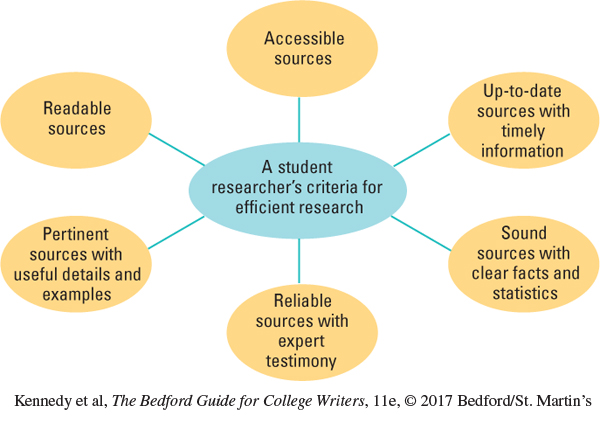C | Evaluating Possible Sources
| C | Evaluating Possible Sources |
Like the perfect wave or the perfect day, the perfect source is hard to come by. Instead of looking for perfect sources, evaluate sources on the basis of practicality, standards, and evidence.
C1Evaluate sources as a practical researcher.
Your situation as a writer may determine how long or how widely you can search or how deeply you can delve into the sources you find. If you are worried about finishing on time or about juggling several assignments, you will need to search efficiently, using your own practical criteria.

C2Evaluate sources as your readers would.
Q-26
If you are uncertain about college requirements, start with recommended sources that are easily accessible, readable, and up-to-date. Look for sources that are chock-full of reliable facts, statistics, research findings, case studies, observations, examples, and expert testimony to persuade your readers.

C3Evaluate sources for reliable and appropriate evidence.
When you use evidence from sources to support your points, both you and your readers are likely to hold two simple expectations:
that your sources are reliable so you can trust their information
that the information you select from them is appropriate for your paper
After all, how could an unreliable source successfully support your ideas? And what could unsuitable or mismatched information contribute? The difficulty, of course, is learning how to judge what is reliable and appropriate. The following checklist suggests how you can use the time-tested journalist’s questions to evaluate print or electronic sources.
Q-27
EVALUATION CHECKLIST
Who?
Who is the author? What are the author’s credentials and experience?
Who is the intended audience? Is it general or academic?
Who publishes or sponsors the source? Is this publisher well regarded?
Who has reviewed the source before publication? Only the author? Expert peer reviewers or referees? An editorial staff?
What?
What is the purpose of the publication or Web site? Is it trying to sell, inform, report, or shape opinion?
What bias or point of view might affect the reliability of the source?
What evidence does the source present? Does the source seem trustworthy and logical? Does it identify its sources or supply active links?
When?
When was the source published or created? When was it revised?
When has it been cited by others in the field?
Where?
Where did you find the source?
Where is the source recommended? Has your library supplied it?
Why?
Why would you use this source rather than others?
Why is its information relevant to your research question?
How?
How would it support your thesis and provide persuasive evidence?
How does the source reflect its author, publisher or sponsor, and audience? How might you need to qualify its use in your paper?